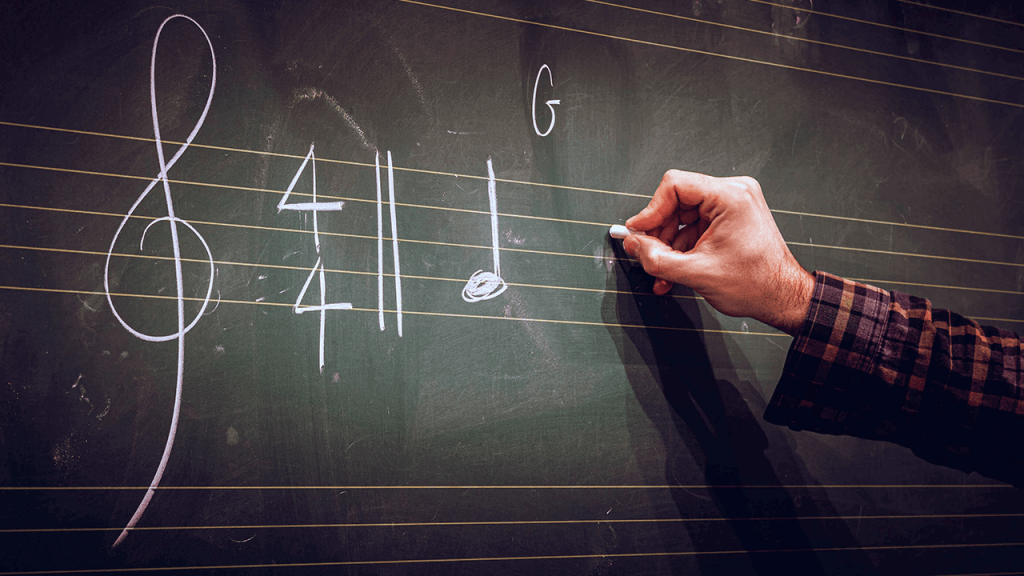When you first start learning the piano, there are a lot of things that can seem daunting. You have to make sense of all the keys on the keyboard, figure out how to maneuver your hands around the keys, and practice, practice, practice. But one of the most intimidating things for beginner pianists is learning music theory. In fact, music theory has such an intimidating reputation to new pianists that it often discourages them from trying to learn the instrument altogether!
What most beginners don’t know is that music theory isn’t some challenging abstract concept – it’s actually very simple to understand, straightforward, and best of all it comes with added benefits! In this post, we’ll take a look at six major benefits of why beginner piano students should learn music theory.
So if you’re new to piano playing and are curious about music theory, read on! We promise that it isn’t as scary as it seems.
What is music theory?
Before diving into the benefits of music theory, let’s take a second to first talk about what music theory is. Music theory, in simple terms, is all of the elements used to create the language of music.
A great way to understand it from a conceptual standpoint is to compare the language of music to another language – like english. To understand english, you must understand its various elements – like the alphabet, consonants vs vowels, how to string consonants and vowels together to form words, how different words sound and what they communicate, grammar rules and how to form sentences, speech prosody, rule exceptions, etc.
All of those individual elements combine to form the English language, and the more comfortable you are with those elements, the better you’ll be at understanding and speaking the language.
This is the same concept with music theory.
To understand the language of music, you must understand how notes are named (alphabets), understand how pitch, loudness, and rhythm work (speech prosody), understand how to string notes together to form melodies and chords (words), understand rules for how to form melodies through the use of key signatures (grammar), rule exceptions, etc. It’s all of music’s little structural things that are designed to help you understand what’s going on in music.
Now, when it’s listed out this way it can seem like a lot, but like learning a new language, you don’t need to learn it all at once but instead you pick it up cumulatively — with each element building on the next until you fully understand how it all works.
Music theory helps you better understand how music works
Growing up, I enjoyed listening to all kinds of different music. Pop, R&B, Gospel, Rock, and many other genres. The music would often leave me either energized, excited, happy, sad, or a mixture of many other emotions. But before I learned music theory, the different genres of music I listened to felt like clusters of seemingly random sounds mixed together to form songs.
That all changed when I began to learn music theory.
After learning music theory, I began to understand, at a deeper level, what was actually happening in the songs I listened to. I began to identify which songs were major, which songs were minor, and how those modes impacted how I felt while listening to those songs. I began to understand how the key, tempo, and song structure across the genres were either similar or different. I began to understand how the same chord progressions were recycled in different genres, by different artists, to create chart-topping hits.
Needless to say, after learning music theory I felt like I was Neo in The Matrix – I wasn’t seeing binary code when listening to songs, but I did obtain a completely different perspective of what was happening in them beyond just instruments being played to support a singer. Best of all, I began to identify trends in what I liked from song to song, for example, thanks to understanding music theory I now know that I’m a sucker for a song that includes a slow 1 to 4 chord progression.
You, as a piano beginner, should learn music theory because it will help you understand how melody, harmony, and rhythm cooperate to produce the music you love, and the music you would love to play. You will be able to make sense of the music you are listening to, playing, and learning. This knowledge will also make it easier to learn new pieces and memorize them more quickly.
Music theory will make learning piano songs easier and faster
When you understand how music theory works, you’ll also understand how to read music that’s written down on sheet music. And similar to how reading English books becomes easier the more comfortable you are with the English language, reading sheet music becomes easier the more comfortable you are with the language of music. As reading music becomes easier for you, learning songs becomes faster and easier as well.
And the benefit extends beyond just reading music — once you better understand the language of music, you’ll also more easily be able to learn songs by ear, or even create your own compositions!
You’ll be able to communicate with other musicians more effectively
If you ever decide to form a band or join an orchestra, the ability to communicate with other musicians effectively is essential – and learning music theory will help with that!
Everyone in a band should be self-aware of the music, and how it was written, and the musical intricacies within the song. This awareness and knowledge will help you effectively communicate with the other musicians, to create an enjoyable ensemble experience and sound.

You’ll be able to play piano more expressively
Knowledge of simple music theory terms will also help you play piano more expressively by teaching you how to use dynamics, tempo markings, and phrasing markings while you learn a piece. These markings are placed in sheet music by composers to help you understand the intention of the composer’s writing, and how to make it sound as they envision.
You’ll have greater appreciation for the music you listen to
When you have knowledge about music theory, listening to music becomes a whole new experience because you’ll start understanding what’s going on in the song as it’s being played.
You’ll start hearing things that you never noticed before. You will be able to contextualize what you hear in terms of harmonic and rhythmic theory. Your appreciation for all types of music will certainly deepen as a result, especially in appreciation for both performance and composition.
Learning a little music theory goes a long way
If you are a beginner piano student, it is highly beneficial to learn music theory. Music theory will help give you a strong foundation for your musical education and will make learning new pieces easier. Additionally, understanding music theory can improve your sight-reading skills and help you become a more well-rounded musician.
If you’re ready to learn music theory, there are many great resources available online that can get you started. With just a little bit of effort, you will be on your way to becoming an accomplished pianist!

